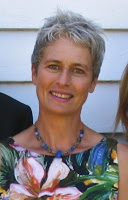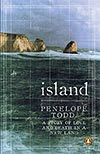Penelope Todd is a writer, editor and manuscript consultant currently living in Dunedin. She has had seven young adult novels published by Longacre Press, including her Watermark trilogy, and a memoir, Digging for Spain: A Writer’s Journey. Her latest novel is Island, published by Penguin (2010), an adult novel.
(Photo of Penelope Todd by Claire Beynon)
Has it been a difficult transition from writing fiction for a young adult audience to writing fiction for an adult audience – and is it a transition you had been intending to make for a while?
I think the transition is proving more problematic for marketers and reviewers than it has been for me. One wrote of my having to ‘leap a gulf’ but I consider the distinction more or less arbitrary. I’ve always written what I wanted to write. After seven novels about teen experience, I wrote a memoir in which I outlined the changes, inward and outward, that had been precipitated by so much fiction writing (or that had precipitated the fiction – cause and effect are not easily distinguishable). That seemed to mark a shift also in my method of obtaining the story – as if through the airwaves instead of digging it up from underground – a much lighter process in some respects.
I knew Island would interest older readers so I allowed interactions, events, and my characters’ thoughts concerning desire, fate/destiny and mortality (themes evident in all my fiction) to play out more fully. So, no, the transition wasn’t consciously made but my characters had been growing older with each YA novel so, looking back, a shift in marketing was inevitable.
When I saw the title of your book, I thought of Quarantine Island in Otago Harbour. Was your own experience of visiting Quarantine Island an important source for the geography and “feel” of the island in your book, even though the location of the titular island is not specified?
We used to hop (in a boat) across to that island – a.k.a. Kamau Taurua or St Martins Island – when our children were young, to stay weekends in the big old house. We’d wander over the hills and shore, pat the donkeys, fish off the rocks and visit the sad little graveyard with its small earth mounds. I absorbed the atmosphere of the place and a sense of its history, and have since overlaid it with my own fictional island and 130-odd years’ distance. However, this might be any quarantine island near any colonial port late in the 19th century. While historical accuracy is important, detailed recreation mattered far less to me than the viability of this fictional community, its members, and their relationships.
Penguin’s publicity material for Island describes it as “literary fiction of the highest quality, and an intensely romantic page-turner”. Do you think that’s a fair description of what you are trying to achieve in Island? If so, how easy a balance is that to maintain?
Well, the blurb came later so I wasn’t aware while writing of teetering on that particular tightrope. I enjoyed diving into a deeper language pool than I would writing ‘current’ fiction, and my sentences are always written with an ear to sound and rhythm. Besides that, I hate to bore myself or the reader so the unfolding story is reasonably pacy and yes, there’s attraction and desire, a little sex, varieties of love – eros, philia and agape, at least.
As for romantic? I might be happier with the r capitalised. It’s not a ‘romance novel’. However, a late mountaineering uncle (Colin Todd after whom the hut was named) was recently described as ‘a romantic idealist’. That weakness runs in the family. But mixed in with the human warmth generated on the island is the grit of an attempted suicide, a diphtheria epidemic and several deaths. I’ll leave readers to judge whether the publicity is fair.
Looking at your entry on the New Zealand Book Council website, I’m intrigued and impressed to see that you recently “travelled to Argentina in order to complete the writing, translation and adaptation of a bilingual novel with Argentinian writer Elena Boss”. That sounds fascinating! How did this project come about, and what can you tell us about it?
I can tell you that I feel very privileged to have had this experience. A fuller account of the process is to appear in the next Booknotes, but Elena and I met on the International Writers’ Programme in Iowa in 2007 and, in order to keep in touch, wrote a novel together – employing characters from each of our countries, and taking alternate chapters. I met Elena again in Buenos Aires last year so we could firm up our translations. We now have a bilingual novel of which Elena is currently entering the Spanish version in MS competitions in South America before we look for a publisher in English, too. I dare say it’s the first-ever bilingual NZ-South American collaborative novel!
In one of your New Zealand Book Month blog posts in 2007, you mentioned the continuing lack of visibility afforded in New Zealand to writers – and in particular woman writers – from south of Christchurch. Quite apart from the inequity of this, it can’t help when promoting a new novel. How can this be circumvented?
Oh, sigh. If anyone has answers to this, could they please tell us, and our publishers? Should we move north to where the publishers, the media engines, the book organisations and the money (in Auckland recently, I heard ‘super-yacht’ slipped into several conversations – what is that?) reside? If it were simply our own invisibility it would hardly matter, but when new work slips through the cracks so quickly, it gets irksome. Getting better at what we do seems not to make an appreciable difference.
There’s some beautiful, under-sung writing happening down here, but we get awfully tired of saying, ‘It’s the process that matters’. Apart from that, I suppose we could all aim to become younger, more attractive, more extroverted… Or, roll on the digital revolution with the democratisation of the publishing process. I’m doing my bit towards that.
Which writers have been most influential on your own writing, and which are your personal favourites? Are there any writers who haven’t received the publicity they deserve that you’d like to recommend?
I hate to single out writers down here – too many are friends and acquaintances -but I name a few in the link above. Off the top of my head, I’ll be eager and curious to read Emma Neale’s and Maxine Alterio’s next novels, and Sue Wootton’s next volume of poetry. The whole country should be. Thoughtful readers should read Ruth Pettis’s two novels. She died two years ago this month – she’s really invisible now, but her work ought never be.
Do you have a plan for how your writing career will unfold? If so, and if it isn’t a secret, where do you see yourself and your writing in five years’ time?
I’m quite a good plodder so I see more fiction unfolding, back and forth in time and place. I always have some longish thing on the go. Meanwhile I want to work more collaboratively so I’m also plodding towards the production of an ebook publishing site – excellent writing carefully selected, sensitively edited and artfully designed, for global sale. But that’s complex and I’m learning on all fronts as I tackle the brand new aspects of this project.
How to buy Island
Island is available online from Fishpond. It should also be available at all good independent bookstores, and is available from some Whitcoulls branches.




